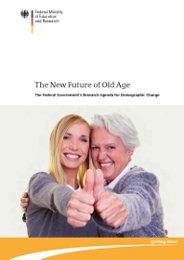Good Nursing Care to Boost Quality of Life
Given the general increase in life expectancy, the number of those in need of care is also bound to rise. As many as 2.4 million people already required nursing care in Germany in the year 2010. Forecasts by the Federal Statistical Office expect this figure to reach 2.9 million by 2020, and about 3.4 million by 2030. This shifts attention to safeguarding and maintaining a humane care in a society of longer lives.
Research can greatly contribute here; its findings may help to remain independent up until old age or support caregivers. This can help reduce the burden for all parties involved whilst improving the quality of life of those affected, their relatives and care providers. The Federal Government has therefore already defined focus areas in the field of old age care that will be carried on and refined.
Maintaining the autonomy of seniors
Maintaining and promoting independence are important elements for a life in dignity up until advanced age. Scientific studies that examine the causes of care demand and possible intervention strategies are hence of particular importance. Of equal relevance are research projects aimed at the enhancement of existing innovation strategies and the development of new, overarching care concepts that promote outpatient care over inpatient care. In addition, care researchers are challenged to find answers for open questions about the consequences of an increasing (multi-) morbidity among care patients.
Relieving caregivers and care receivers
Outpatient care receives particular attention. Many people in Germany wish to live at home, even in the case of care dependency. Caregiving relatives are often placed under great strain, and partly also overburdened.
They need targeted support, even more so, if they additionally provide for their own families and have a job. Care resources within the family must be strengthened in a targeted manner. Technical assistance systems are able to ease the care burden. The Federal Government’s research funding goes into the development of proposals that combine technologies and services in new ways, thereby supporting those in need of care, their relatives, and the caregivers in their everyday routines.
The process and product innovations thereby created can simplify care measures, for example by integrating newly and further developed systems for automatic emergency detection, improved care documentation, or also intelligent medication delivery. Applied in a targeted and responsible manner, assistance systems support those in need of care whilst making a decisive contribution to their independence and safety, for example by way of localization, navigation, or through a memory function.
Moreover, the Federal Government funds projects that promote the integration of international know-how and best practices into the practical organization of familial care and thereby, along with other violence prevention projects, make an important contribution to forestall problematic care relationships. In order to support people in situations, where other measures have reached their limits, we also fund the enhancement of palliative care. In this connection, we pay particular attention to the specific needs of dementia patients. The ultimate objective of all research into the provision of care and services is the safeguard of human dignity, integrity, and the private sphere.
Highly qualified and well informed for better care
Over 890,000 employees are currently working in the long-term care sector. In view of the growing demand, an additional number of caregivers will be required in the future. For this reason, the Federal Government now engages in various activities aimed at securing the future supply of care personnel. Not least by means of care research, we will help ensure that the occupational area of caregiving is further converted into a modern, efficient and attractive sector of employment.
Sound knowledge for practical applications
Research is also meant to contribute to the development of a sound knowledge base for care activities. An efficient and high-quality supply system calls for a rapid transfer of scientific findings and innovations into practice. In this area, the Federal Government will increase its funding efforts. Not only professional caregivers depend on well-founded knowledge, but also caregiving relatives. The Federal Government funds projects that focus on the provision of patient information and training programmes, for example geared towards the chronically ill. The transmission of knowledge and skills serves to promote a self-dependent management of personal care circumstances.


